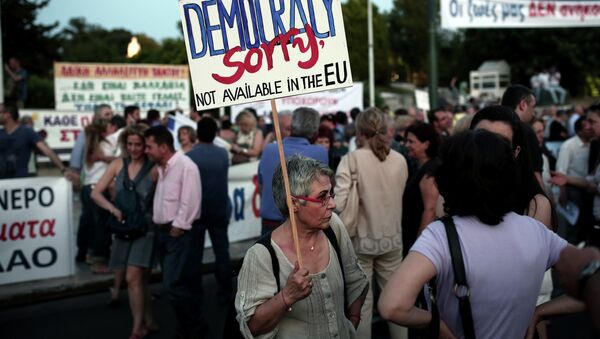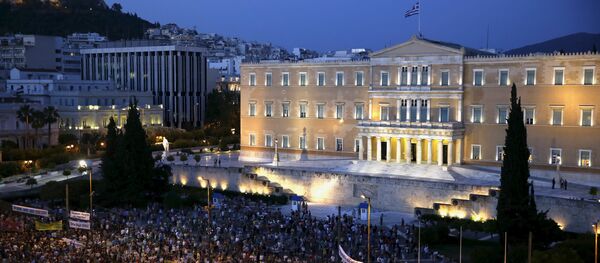Discussions between Prime Minister Alexis Tsipras and its creditors, the European Union, the European Central Bank and the International Monetary Fund have not resumed since they broke down on Sunday night, prompting many Greek citizens to organize a rally in Athens.
"Many of us are fighting to save our jobs, our families and the country from the poker game the government is playing on the negotiation tables in Brussels," Greek business consultant George Prokopakis told Sputnik.
Anti-austerity protest grips Athens as thousands rally http://t.co/XBEaGQEeAS pic.twitter.com/1xio1ZFtfi
— Ruptly (@Ruptly) June 18, 2015
"We don't want flags, we don't want placards — but we have whistles to blow, to wake up the Greek government. There is a different Greece and this is the Greece we need to save."
Prokopakis told Sputnik that Thursday's rally in Athens was a spontaneous reaction by the Greek people via the Internet to the news that negotiations had collapsed on Sunday night.
"Today's rally is in support of Greece. It's a big problem, not only with the government — but the opposition party doesn't make a clear stance to offer an alternative and push the government to do something.
"That's why me — a businessman in my 60s — has become politically active. If there was a serious debate going on between the Greek government and the Troika I would have no reason to mobilize people. But we don't know from one day to the next what is going to happen.
"We understand very well what is going on — but the information we get from the government is distorted. We need to resort to foreign media to understand what is going on. The Greek media give a completely distorted view…"It may be default or drachma and more misery for the Greek people. People are in shock and awe with what's going on, that's why we've called a rally.
I liked a @YouTube video from @ruptly http://t.co/DT1apTlYbu Greece: Anti-austerity protest grips Athens as thousands rally
— Éamonn ÓGallchobhair (@Irishede) June 17, 2015
"Many Greek people understand very well what is going on and that there was a solution to this problem, but the austerity measures that were offered to the previous government were rejected."
#antiAusterity protest outside the #hellenic parliament #Athens #Greece June 17 pic.twitter.com/1txbm5G0Xn
— ✌☮#BoycottIsrael☮✌ (@Chara_fc) June 18, 2015
The Bank of Greece has warned that the country's future within the European Union is at risk if it defaults on its debt to the International Monetary Fund and rejects the austerity measures proposed by Brussels in return for a cash bailout.
Deal or Democracy
Speaking to British media, Greece's chief negotiator, Euclid Tsakalotos said that if Greece can't reach an "economically feasible plan" it will consult the people of Greece.
Astonishing. Less than year ago, Greece was growing, running primary surplus and issuing bonds at below 6% yield. https://t.co/A6tOsHVwIo
— Simon Nixon (@Simon_Nixon) June 18, 2015
Eurozone finance ministers are meeting in Luxembourg — the agenda dominated by the economic crisis in Greece and the potential 'Grexit' from the European Union — a forum, according to Greece's Finance Minister, Yanis Varoufakis, not appropriate to "stage fresh conversations that have not been prepared in advance."
"I do not believe this preparation has taken place and also it's my considered opinion that now the agreement has to be reached at a level of political leaders, heads of state, prime ministers, chancellors."
EU leaders are still waiting to receive new alternative proposals from the Greek government, testing the patience of the Eurozone partners — and the nerves of the Greek people as the country remains on the edge of the European Union and potentially bankrupt.
#Merkel addressing the Bundestag: goal is to keep #Greece in euro, deal with creditors "is still possible". Really not a passionate speech.
— Maxime Sbaihi (@MxSba) June 18, 2015
Eurogroup President Jeroen Dijsselbloem said: "It's up to the Greeks to present a number of alternatives. Everything they don't want, they have made abundantly clear. That means they will have to present other alternative proposals. We are still waiting for that. So long as we don't have those, we cannot complete the deal."
Greece has until 30th June before it has to pay $1.8 billion (€1.6 bn) back to the IMF to avoid bankruptcy.



